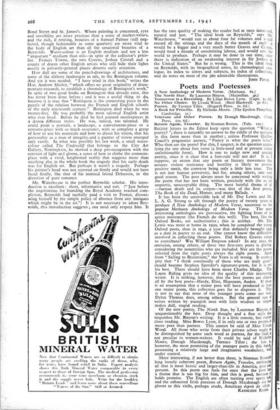Poets and Poetesses
A New Anthology of Modern Verse. (Methuen. 6s.) The North Star. By Laurence Binyon. (Macmillan. 43.) Return Again, Traveler. By Norman Rosten. (Yale. I2s.)
RECENT letters to the Editor keep open the question "What is poetry? "- there is naturally no answer to the riddle of the universe in this form more than in another ; unless Professor Quiller- Couch's pragmatist answer, "Poetry is what the poets write.' Who then are the poets? For this, I suspect, is the question under- lying the one about free verse (a little-used and at present rather unfashionable form). How is one to judge new and untried poetry, since it is clear that a foot-rule will not do? It is, I suppose, an axiom that any poem or literary movement that arouses violent resistance and hostility is likely to possess positive merit, the converse being only a little less true. This is not just human perversity, but for, among others, one very good reason. The poet always must be concerned with writing the poem that has not been written, precisely with the as yet unpoetic, unacceptable thing_ The most hateful theme of all —human death and its corpse—was that of the first poetry, The Book of the Dead, Homer, and many Ballads. • It has been the unenviable task of Mr. Day Lewis and Mr. L. A. G. Strong to sift through the poetry of twenty years to produce A New Anthology of Modern Verse, successor to the popular Methuen Anthology of Modern Verse. The most interesting anthologies are provocative, the fighting front of an active movement (the French do this well). The best, like the Oxford Books, are authoritative ; this- is neither. Mr. Day Lewis was more at home in 1930, when he compered the young Oxford poets, than in 1940, a year that definitely brought 1930 as a date in poetry to an end. One cannot know the difficulties involved in collecting these poems. Did Robert Graves refuse to contribute? Was William Esnpson asked? In any case, the omission, among others, of these two first-rate poets is glaring, considering the nonentities who are included. Nor are the poems selected from the right poets always the right poems. Apart from "Sailing to Byzantium," the Yeats is all wrong. It seems a pity that "I think continually of those who are truly great" should become Stephen Spender's signature-poem, for it is not his best. There should have been more Charles Madge. The Laura Riding gives no idea of the quality of this interesting writer. It is staling, however, that the best poems are almost all by the best poets—Hardy, Eliot, Housman, Auden. If there is an assumption that a minor poet will have produced at least one major poem, this collection goes far to disprove it. This is not to say that none of the younger poets come out well Dylan Thomas does, among others. But the general run of verses written by youngish men with little wisdom to impart makes dull, stupid_ reading. Of the new poetry, The North Star, by Laurence Binyon,iS unquestionably the best. Deep thought and a fine style dis- tinguishes Mr. Binyoaa's writing. It is a little remote, but rePar close reading. Miss Bowes Lyon, if in only one or two poems, is more poet than poetess. This cannot be said of Miss Ursula Wood. All those who write from their private selves ought lo be distinguished by some such word as poetess, for the fault is not peculiar to women-writers. It could be said of Nicholas Moore, Donagh Macdonagh, Terence Tiller ; the last is, however, the most promising of the younger poets in this bate', possessing a relatively large and imaginative vocabulary, salt under control.
More interesting, if not better than these, is Norman Rosten't long loosely coherent poem, Return Again, Traveler, embracisig all that is most heroic and larger-than-life in America, past ani. present. In this poem one feels for once that the poet "; a theme that is too big for him, and this is good, because holds promise. The English are often turning over spent sok and the exhausted Irish passions of Donagh Macdonagh are be ghosts to this virile, perhaps crude, American esprit de slide.
KATHLEEN RANO' KATHLEEN RANO'


























 Previous page
Previous page